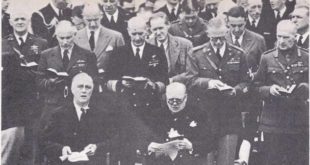Even before Pearl Harbour, there had been cooperation between the United States and Britain. In August of 1941, President Roosevelt and Prime Minister Churchill met secretly, on a cruiser at sea off the coast of Newfoundland. There they drew up the Atlantic Charter, a document stating the principles on which they based their hopes for a better future for the world. They pledged that neither country would seek more territory. They hoped that, “after the final destruction of Nazi tyranny,” all men in all lands could “live out their lives in freedom from want and fear,” and they called on …
Read More »Tag Archives: Heinrich Himmler
Fire in the Reichstag 1923 – 1933
DURING THE years that followed Hitler’s adventure in the Munich beer hall, ministers came and went in the German government. Among them were some able men, particularly Gustave Stresemann. He was foreign minister from 1923 until his death in 1929. His policy was to work out a way of getting along with Germany’s former enemies; so that Germany’s mighty industrial machine could operate again as it had in the past. This policy brought results. Inflation was stopped and foreign bankers made large loans to German industry. Smoke poured from the smokestacks of Germany’s efficiently run factories and the republic began …
Read More »
